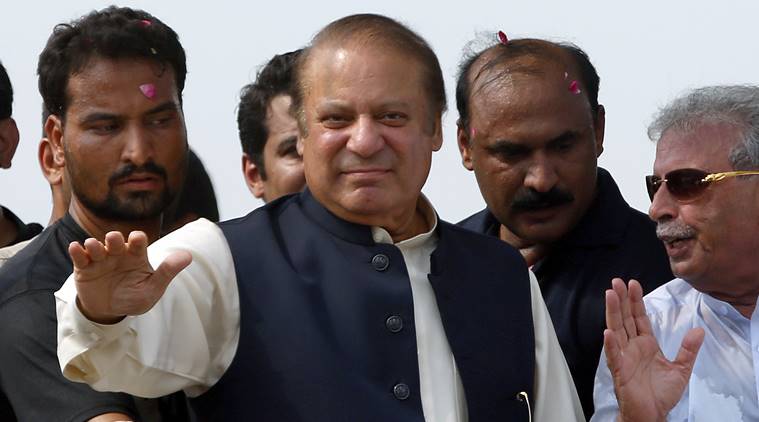Opinion The India index
It is the touchstone of being Pakistani and politicians cannot forget that
 Nawaz Sharif, who has been disqualified from holding public office for life by the Supreme Court in the Panama Papers case, said Pakistan has isolated itself. (AP)
Nawaz Sharif, who has been disqualified from holding public office for life by the Supreme Court in the Panama Papers case, said Pakistan has isolated itself. (AP)  Deposed Pakistan Prime Minister Nawaz Sharif (AP)
Deposed Pakistan Prime Minister Nawaz Sharif (AP)
Pakistan has landed in times where religiosity has peaked with the state beating a retreat before it; and when a reference to a politician’s “India index” brings the state down on his head. Nawaz Sharif has been outed for “corruption” but what damns him most is his “India-sucking”, that is, in Pakistani slang, kowtowing to India’s evil designs and thus harming the Kashmir cause. Hence the latest charge from Imran Khan who wants to rule Pakistan after a snap election: “I claim today that Sharif will do everything possible to save his Rs 300 billion transferred through money-laundering. O Sharif! You will even befriend Modi to save your money. You will sacrifice all interests of Pakistan at the international level.”
He had Nawaz on the mat on two grounds, ideology and nationalism, both expressed as the ultimate criterion of nationhood in the textbooks that no one can detoxify. There is an appeal in this statement to the empowered clerical underworld interfacing with terrorism and the army that stands as guardian of Pakistan’s foreign policy and internal security. The message is: Get rid of this deviant who will destroy Pakistan by making it go in a direction that it is not meant to take. Pakistan’s India policy is so isolationist that even China is bothered by it. An independent foreign policy became so problematic that Nawaz Sharif finally decided after 2013 not to have a foreign minister. The opposition and the media hauled him over the coals for this “neglect” of foreign policy, but the facts point to significant events of the past shaping his decision not to have a foreign minister.
One had occasion to meet the former Indian High Commissioner to Pakistan, T.C.A. Raghavan, in Lahore. He came across as a moderate person allergic to hard positions and willing to understand when his Pakistani interlocutors fly off the handle. Then his book ‘Attendant Lords: Bairam Khan and Abdur Rahim, Courtiers and Poets in Mughal India’ came to Pakistan and convinced me of his meticulous regard for facts. His second book ‘The People Nextdoor: The Curious History of India’s Relations with Pakistan’ (2017) has me riveted because of its unerring treatment of how Pakistan has dealt with its “India-index” problem. When I was trying to figure why out Nawaz Sharif would not keep a foreign minister, TCA’s book laid it out clearly for me.
Nawaz Sharif emerged from the army’s overthrow of Prime Minister Zulfikar Bhutto and was considered the army’s challenger of the Bhutto legacy in Pakistan. He fit the “India index” judging who as PM would pass muster at the GHQ. But over the decade of the 1990s he became tired of repeatedly losing his job and coming up against the “index” when he tried to break out of the cycle of low growth and “asymmetrical” conflict after the world had lost interest in Kashmir post-Simla Agreement of 1972. TCA tells us how Sharif’s Foreign Office let him down when he was trying to “normalise” with Prime Minister I.K. Gujral at a Commonwealth Summit in 1997.
He quotes Gujral: “The Pakistani PM started the conversation by offering to sell us surplus electricity. I responded positively but soon his offer was shot down by Shamshad Ahmad and Gohar Ayub Khan (foreign secretary and foreign minister respectively) on the plea that since other issues were pending, selling surplus electricity may not be practicable. I left the matter at that. What was surprising was that the PM’s own colleagues could, in a brazen style, defy him in our presence.”
TCA’s lucidity and dexterous reliance on documents explains Sharif’s next lapse from the “index” when, in post-nuclear 1998, an extraordinary prime minister of India, Atal Bihari Vajpayee, visited “the Minar-i-Pakistan in Lahore, a monument that symbolised the creation of Pakistan as a separate country. This was a reiteration — if one was needed — that India accepted the reality of Pakistan.”
Perhaps at that very moment, Sharif’s army chief was busy mounting his Kargil Operation against India which scuttled his government and led to his fall that nobody in Pakistan really minded. The world minded, however, and heaped on Pakistan the kind of opprobrium that even the GHQ has now learned to accept as unavoidable. The India index is the touchstone of being Pakistani and Sharif has had to bow out of power once again in 2017 because he was in breach of it in what is now known as “Dawn leak”, apart from his strangely liberal routine of visiting the Hindu community in Karachi on Holi each year and telling them he was “one of them”.




